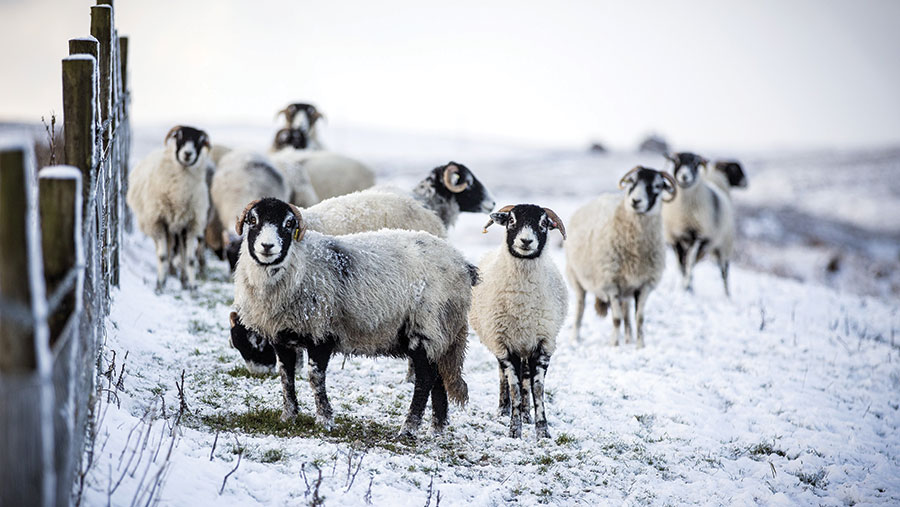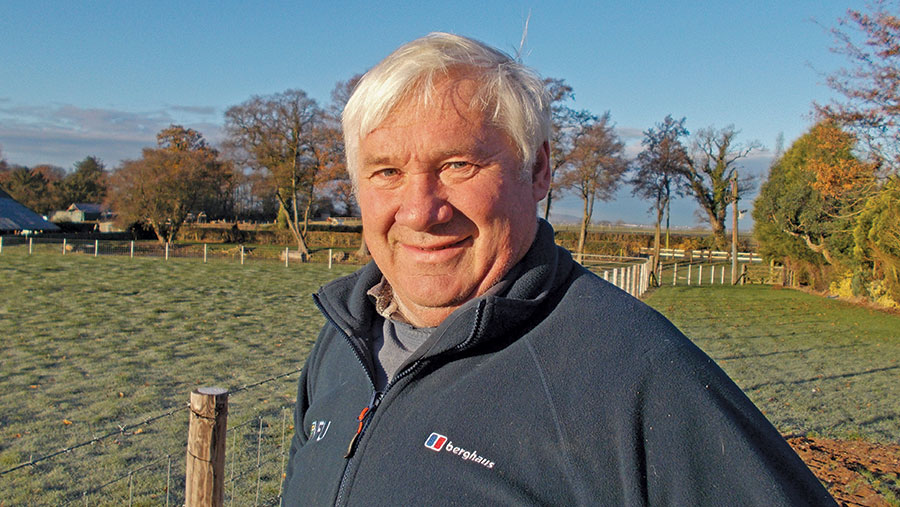How farmer-vet ‘clubs’ are improving flock health
 © Andrew McCaren/LNP/REX/Shutterstock
© Andrew McCaren/LNP/REX/Shutterstock The contact between sheep farmer and vet is often a once yearly affair focused on meeting flock health planning requirements, but a relatively new collaborative concept is forging stronger relationships and encouraging preventative flock health management.
Flock health clubs encourage groups of sheep farmers to come together and pay a monthly subscription to attend regular vet meetings and access vet advice throughout the year.
Some vet services may also be included (see ‘Flock health clubs – how they work’).
In doing so, vet costs can be planned ahead and are shifted from being seen as a “bad cost” associated with treating sick animals to a “a good cost” focused on disease prevention and long-term cost savings, according to concept founder, Fiona Lovatt of Flock Health.
See also: How Irish dairy farmers established a sheep milk business
She believes smaller margins are one of the reasons for lower engagement between sheep farmers and vets compared with dairy systems, which have long bought in to the concept of preventative vet work.
However, research carried out in 2013 highlighted other, more widespread concerns.
Improving the vet/farmer relationship
Dr Lovatt explains: “Researchers spoke to sheep farmers about what they thought of their vet.
Some said they were too expensive or too focused on dairy or they didn’t have good links with a sheep-interested vet in their practice.
Vets said sheep farmers didn’t want to pay or collect data. It was fairly damning.”
As a result, she set-up and introduced the flock health club concept to UK vets.
The initiative has taken off with some force, with an estimated 40 sheep clubs now in existence across the UK.
Some vets are also rolling out the idea to beef farmers (see ‘Club concept benefits beef’, below), who have traditionally had a similar relationship with their vet to sheep producers.
The benefits and types of farms it suits
There are a variety of sheep system types involved.
However, Dr Lovatt believes the club concept could be more appropriate to smaller flocks of about 200-500 ewes who perhaps couldn’t justify regular preventative vet support in the past and haven’t had much vet engagement.
She believes knowledge sharing is a huge benefit of the initiative.
She explains: “As farmers are meeting with other farmers, they can compare their performance to others and benchmark.
“They can then see that what they thought was normal, might not be, so they can investigate accordingly.
“Benchmarking and peer-to-peer contact is hugely valuable, with a vet at the centre of the club,” she says.
Paying a monthly subscription – a bit like a gym membership – also encourages greater farmer buy-in and encourages them to attend meetings as they can see a value in attending.
In terms of cost benefit, Dr Lovatt says the main emphasis is on long-term disease prevention, which will ultimately bring cost savings.
She says a farmer may have already had regular vet input up until joining a club could well experience cost savings by joining, while also having the added benefit of spreading cost, month by month.
In comparison, a farmer that hadn’t had any relationship with their vet will undoubtedly see an increased cost, however the long-term benefits are likely to be marked.
Flock health clubs – how they work
What are they?
Flock health clubs are set up by vets to offer groups of sheep farmers technical advice and support around preventative flock health management. They are based on a monthly subscription.
Who runs them?
Individual vet practices take responsibility for setting up their own club or clubs and have the option of using resources from Flock Health – the consultancy company who came up with the concept. Some vet practices choose to run several flock clubs focusing on different system types, such as an upland flock health club, lowland flock health club or a pedigree club.
How much does it cost?
The cost varies depending on individual vet practices, but is generally a monthly subscription. On average, this is about £20/month.
What’s included?
There are a variety of flock health club templates operating around the country. Generally, they include three to four group meetings a year, some of which may take place on farm.
Some vets include benchmarking, post-mortem examinations, fecal egg counts or blood tests, for example. Flock health planning may be included or an additional cost.
What are the benefits?
The groups promote better communication between sheep farmers and vets, giving producers regular access to technical advice and the opportunity to discuss flock health with other farmers. The monthly fee also allows easier budgeting.
There’s also the potential to save costs in the long-term by preventing disease.
How do I get involved?
Contact your farm vet to discuss whether a flock health club could be set up by your practice. For more information visit the Flock Health website.
‘It proves you can up your standards’

John Parry
Sheep farmer, John Parry has always been keen to drive health and performance in his 650 Mule flock at Sheep Close Farm, Codsall Wood on the Shropshire/Staffordshire border. owever, since joining Lambert Leonard and May’s Flock Health Club he has made even greater strides.
He believes his £30/month membership fee is money well spent and will ultimately help him to reduce costs in the long-term – something he is already seeing first-hand.
“I’m spending £360/year extra so I have increased my vet bill, but I’m sure I’m using an awful lot less drugs. I was using about 40 bottles of pen strep a year before, but now it’s probably 10,” he says.
One of the reasons for the drop has been a change in attitude to lame sheep which was spurred on by attending one of the club’s group meetings.
Speaking to other farmers highlighted that having lame sheep and worm problems wasn’t an inevitability of sheep farming and instigated a move to change management practices.
“It proves you can up your standards. And never presume you can’t improve, as you can. It makes you want to be as good as what other farmers can achieve,” Mr Parry comments.
His focus has been on treating lame sheep at a lot earlier stage and similarly dealing with worms before he starts seeing a drop in growth rates.
The club has covered a variety of topics, from ewe body condition to mastitis, ram fertility and the use of EID to monitor performance.
Mr Parry believes the monthly invoice encourages him to attend meetings and works out to be “very cost effective.”
“You’re cutting down on drugs and particularly on your own time looking after sheep. And as sheep are healthy, you’re probably increasing performance and improving your market returns,” he concludes.
Club concept benefits beef
Following the success of their “Teesdale flock health club”, Castle Vets in Barnard Castle have set up their own beef club to spread the benefits to their suckler herd clients.
The “Teesdale suckler health club” came into existence about 18 months ago and has four members, compared with nearly 30 in the practice’s flock health club.
Members pay a certain amount per month which includes specific services such as pregnancy diagnosing, fertility testing bulls, checking calves have received enough colostrum and whether cows are fit to go to the bull.
The aim is to also run four meetings a year on all aspects of herd health such as calving or disease control. In the longer term, once numbers have grown, benchmarking is also likely to be included.
Vet, Will Barker believes the service helps create a stronger relationship between beef and sheep farmers and their vet. The ability to plan is also beneficial.
He explains: “We felt there was a need for farmers to be able to plan their costs ahead and for us to offer a gold standard of service to our beef farmers.
“We have already seen some good results including increased fertility rates and calf health and it’s helped us identify areas of improvement to drive health and performance on those farms,” he adds.
